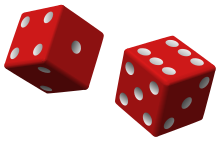
A random number is generated by a random (stochastic) process such as throwing Dice. Individual numbers can't be predicted, but the likely result of generating a large quantity of numbers can be predicted by specific mathematical series and statistics.
Algorithms and implementations
Random numbers are frequently used in algorithms such as Knuth's 1964-developed algorithm for shuffling lists. (popularly known as the Knuth shuffle or the Fisher–Yates shuffle, based on work they did in 1938).
In 1999, a new feature was added to the Pentium III: a hardware-based random number generator. It has been described as "several oscillators combine their outputs and that odd waveform is sampled asynchronously." These numbers, however, were only 32 bit, at a time when export controls were on 56 bits and higher, so they were not state of the art.
Common understanding
In common understanding, "1 2 3 4 5" is not as random as "3 5 2 1 4" and certainly not as random as "47 88 1 32 41" but "we can't say authoritavely that the first sequence is not random ... it could have been generated by chance."
When a police officer claims to have done a "random .. door-to-door" search, there is a certain expectation that members of a jury will have.
Real world consequences
Flaws in randomness have real-world consequences.
A 99.8% randomness was shown by researchers to negatively affect an estimated 27,000 customers of a large service and that the problem was not limited to just that situation.
See also
- Algorithmically random sequence
- Quasi-random sequence
- Random number generation
- Random sequence
- Random variable
- Random variate
- Random real
References
- Richard Durstenfeld (July 1964). "Algorithm 235: Random permutation". Communications of the ACM. 7 (7): 420. doi:10.1145/364520.364540.
- Robert Moscowitz (July 12, 1999). "Privacy's Random Nature". Network Computing.
- "Hardwiring Security". Wired. January 1999.
- Terry Ritter (January 21, 1999). "The Pentium III RNG".
- "Unpredictable Randomness Definition". IRISA.
- Jonathan Knudson (January 1998). "Javatalk: Horseshoes, hand grenades and random numbers". Sun Server. pp. 16–17.
- Tom Hays (April 16, 1995). "NYPD Bad Cop's Illegal Search Mars Career". Los Angeles Times.
- A pre-compiled list of apartment numbers would be a violation thereof.
- ^ John Markoff (February 14, 2012). "Flaw Found in an Online Encryption Method". New York Times.
- Reid Forgrave (May 3, 2018). "The man who cracked the lottery". New York Times.